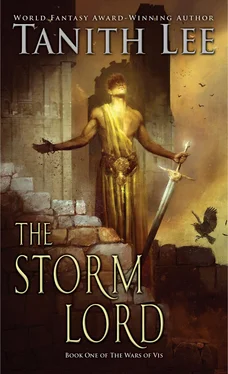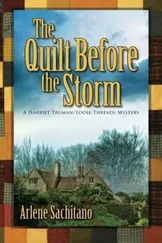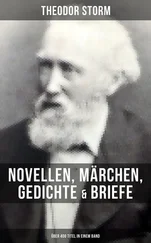“I am the golem of the goddess.”
The terrible jest filled the priest’s brain. He lapsed by their fire to wait.
At midnight there came a peculiar intensity over the city, like the brittle contraction, the unseen shimmer that precedes a storm.
The Dortharians spoke in loud, broken whisperings about the streets. In the garrison, men swore and swilled their wine. The air hummed. Yannul the Lan lay stiff as starch in the Ommos bed, feeling the city moving as though a torrent rushed under its roads.
The rain broke early as the snow had been late. Yet it was an uncertain, fickle thaw; flakes still met in silver spirals, though the gutters ran with mud.
These bright spinnings beat on the shutters of Yr Dakan’s chamber as Ras moved noiselessly across it and swung down the bronze candle wheel and snuffed its lights. On the floor an erotic painting of young men throbbed in the glow of a plum-colored lamp.
Yr Dakan lay in the big bed, eating sweets. Sometimes a girl would lie beside him awaiting his intentions, or a boy, or possibly both. Tonight the space was empty.
Ras crossed to the bed and stood looking down.
“What do you want?” Dakan demanded irritably.
“Lord Dakan,” Ras said softly, “since I came to you I have been an obedient servant.”
Dakan said lazily: “You’d have felt the lash otherwise.”
“Lord Dakan,” Ras whispered, his face unchanging, “tomorrow night, one of this household will kill you.”
Dakan started up, letting fall a nibbled delicacy.
“Who?” he rasped. His eyes glittered with shock. “Who?”
“Any one of us, Lord Dakan. Perhaps Medaci, the girl who bakes your bread. Perhaps Anim, who looks after your stable. Perhaps myself.”
Liverish anger rushed into Dakan’s sickly face.
“Zarok has burnt a hole in your brain. You’re mad. I shall have you whipped tomorrow.”
“A good measure, Lord Dakan. Don’t spare the thong. Beat me senseless. Cut off my hands so I can’t grip a knife to harm you with.”
Dakan caught Ras a blow across the face.
“Tomorrow I will have Orklos deal with you.”
Ras said expressionlessly: “There is talk of a king. Do you remember Raldnor of Hamos? He’s instructed us to murder every Vis in the city, Lord Dakan. Tomorrow, on his signal, at the seventh hour after sunset.”
“Zarok has scorched you,” Dakan repeated, but his heavy face was heavier with fear. Eventually he said: “How do you know all this?”
Ras’s smile was a stillbirth which scarcely altered his mouth.
“My mind. Have you never heard the tale that the people of the Plains talk inside their heads?” He turned and walked to the curtained doorway and looked back. “Kill all your Lowlanders, Yr Dakan,” Ras said. “Kill us before the snake stirs in us. Then bar your door.”
It was still very cold.
The two soldiers who set out every five days for the gust-battered town of Sar, taking Riyul’s report to the Storm Lord, kicked their beasts into a lather, and damned the mail that clung to them like a second skin of ice. Those who remained in the garrison slept badly at night; by day they hanged Lowlanders in an ancient marketplace.
On the morning of Riyul’s name day the clouds were lined with a thin skim of gold, as if a split wine gourd had spilled over.
Yr Dakan came late to the table.
“I hope you’re in good health,” Yannul said.
Dakan did not look well. He grunted.
“Tell me,” he muttered, “do you think there is something abroad in my house—some conspiracy against me?”
“Who would dare such a thing?”
“My slaves—my Lowland slaves . . .”
Yannul let out a sharp laugh.
“Lord Dakan—you leave me speechless. The lily-livered rubbish are incapable of violence. Besides, how could they escape punishment if they had such a plan? Amrek’s soldiers would be only too glad of the excuse to butcher the lot.”
“One of my servants has told me that there will be an attempt upon my life tonight,” Dakan said.
“Who?” Yannul knew at once his question had been too ready. He added swiftly, “Whoever told your lordship such a thing’s a madman.”
For some reason an instantaneous picture had formed in his brain—of the thin, strange-eyed Lowlander who lit the lamp on his first night in the city. “But no matter,” he thought. “Whoever blurted, there’s no stopping now.”
Dakan’s face relaxed.
“Yes, the man who told me this is mad. I have long suspected it. I will bar my door,” he added to himself, “a mere precaution . . . where will you be beyond sunset?”
Yannul, who had never seen fit to speak of his second role in the garrison, slyly drooped one lid.
“A little Elyrian,” he murmured, carefully not stipulating his invention’s sex, “has offered me entertainment for the night.”
By noon the Dortharians were in the streets, selecting Lowland girls for Riyul’s feast. Their acts of rape had taught them to be generally unafraid of the old reputed sexual magics of the Plains women. They were, it was true, all bones—frigid, unwilling bitches. But part of Riyul’s wine ration had already gone round in the garrison, and the soldiers regarded these skinny makeshift wenches cheerfully enough.
The women collected in the chariots with an expected pathetic docility. Some wept—slow tears without sound. The Dortharians did not notice that their eyes held a crystalline hardness in them, like zircons.
The men pulled up their skirts, cuffed them, and laughed at them, and eventually left them to the mercy of the garrison whores, who spat in their faces as they wound ribbons like colored weeds through their hair.
At last they huddled in the dark like dolls made of rags, in their gaudy anklets and glass beads, and with blank faces and trembling bodies. Their hard, cold, wise, and terrible eyes were fixed on the flags.
Night fell and thickened. A thin layer of snow gilded the streets. In the fifth hour after sunset ice formed like glass.
Inside the palace hall the torches had blazed since dusk, and carcasses turned on the great hearths, spitting fat. Three quarters of the garrison was present, lolling at the tables, steeped now in the plentiful wine and beer. A troupe of dancers, of mixed Elyrian and Lowland blood, had been caught lingering in the city at twilight. Brought in to entertain, they turned somersaults with anxious eyes, while their girls tremulously shook strings of bells. They understood well enough that they might be given money tonight, but flogged into pulp in the morning. Amrek had no mercy for their kind.
Riyul sat in his place in tarnished finery—a couple of defaced gold armlets, loot from an old war in Thaddra, and a grease-spattered scarlet shirt. A soldier had died the night before, and Riyul had appropriated the black wolf pelt from among his belongings, and wore it now on his own back. He was very drunk, as were his men. It was late that he recalled his new lusts.
He looked about for the juggler.
“You there, Lan,” Riyul shouted, catching sight of the man at a lower table, “you’ve been gorging our meat, but have you kept your word, eh?”
“My word, Lord Riyul?”
“These temple trulls you idle with—where are they?”
The Lan grinned.
“Outside, my lord.”
A ragged cheer went up. Men banged their wine cups on the board.
One of Riyul’s aides was sent lurching to the hall’s single entrance. When the big door was opened, into the oppressively close air blew a gust of the vicious night. The torches curled and smoldered.
“Bring ’em here!” Riyul roared.
The silence of curiosity fell on the feasters.
The little Lowland girls, employed until now as servitors, turned their pale faces and stared. The garrison whores muttered spiteful sarcasms.
Читать дальше












